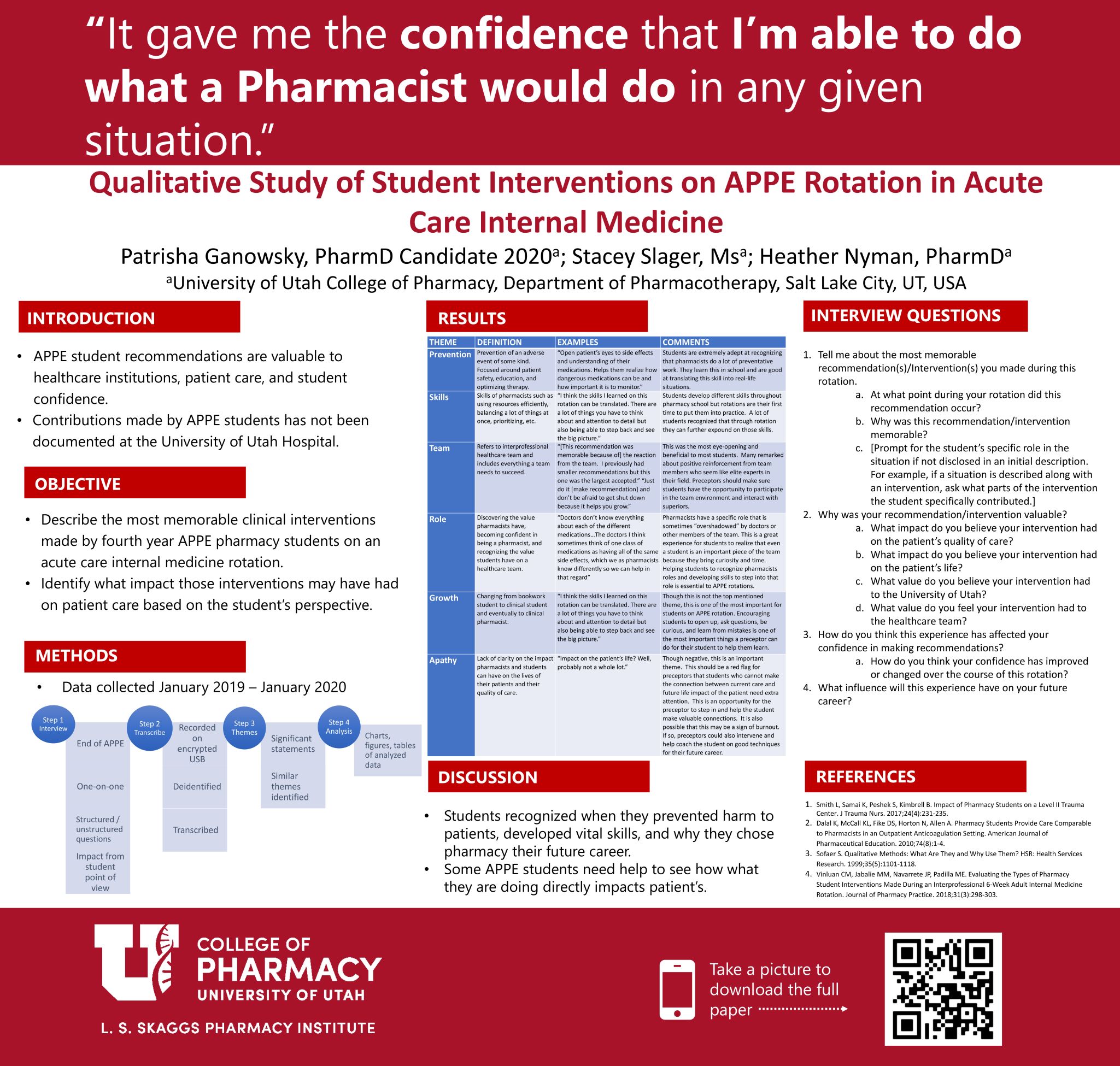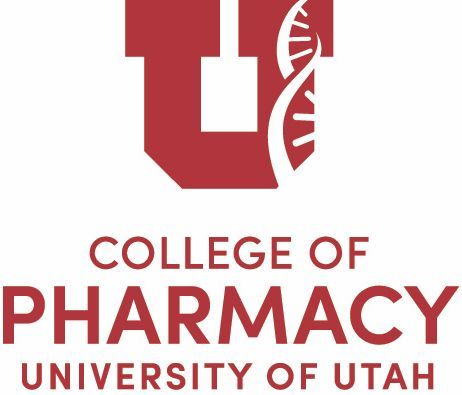Qualitative Study of Student Interventions on APPE Rotation in Acute Care Internal Medicine

ABSTRACT
OBJECTIVE:
To describe APPE students’ most memorable clinical interventions and their perception of the impact those interventions had on the lives of patients and on the students’ own professional development.
METHODS:
Semi-structured interviews were conducted on a one-on-one basis with students upon completion of an acute care internal medicine rotation. An inductive approach was used for data analysis. The transcripts were coded and divided into groups of similar themes to identify patterns.
RESULTS:
Eight students were interviewed about their experiences on rotation in acute care internal medicine. Six themes emerged from 40 unique codes. The themes in order of most frequent occurrence are prevention, skills, team, role, growth, and apathy.
CONCLUSION:
This study demonstrates that fourth-year APPE students on rotation in acute care internal medicine are valuable to the healthcare team and that APPEs, as a whole, are beneficial to pharmacy students in multiple aspects. However, it was discovered that APPEs are lacking in helping pharmacy students to connect how the recommendations they make day to day impact a patient’s quality of care and affect a patient’s life.
Published in College of Pharmacy, Virtual Poster Session Spring 2020
Patricia, Nicely done! I like the way you identified the themes and organized them in the chart. I was surprised and concerned to see “apathy” as one of the themes. I wonder how often that appears (obviously enough to make the table), and whether we might be able to identify predictors of students who will struggle in this regard and might need more input from faculty and preceptors, even before the APPEs? Do you have any thoughts on that? Also, related to that question, were there any patterns in the themes such that for students for whom apathy was a theme, other themes were also stronger or not as strong?
Dr. Keefe,
This is something that surprised and concerned me as well. I didn’t specifically go through the data and see if other themes were stronger or not in students where apathy emerged but it is something that would be extremely interesting to look at. I do know that those students were very good at prevention or the intellectual side of the work they were doing. I am unsure if some students just have a hard time transitioning from didactic cases to actual cases and realizing that these are real people (maybe need more patient interactions?) or if it is a sign of potential future burnout? Apathy was mentioned 16 times which was significant enough for it to be included. Listening to one of the students in which this theme was very apparent I kind of wanted to give him a hug and say “what you do matters! You are making a difference!” I wonder if there is something that could be implemented during the curriculum to help students make these connections to how they are helping patients personally? I think discussions about this subject from preceptors could be helpful in identifying this in students and then help them throughout the rotation.
Nice job! Which theme, in your opinion, suprised you the most?
I think “Team” is one that surprised me the most. Students learned the most when they spoke up to a team member of “authority” or “long-term knowledge” in their field. When they received positive reinforcement from one of those members of the team students exponentially gained more confidence. I think it is interesting that it isn’t necessarily their preceptors positive reinforcement but the team’s that really helps the students grow. The other one was apathy. It was surprising to me that some students really have a hard time making that personal connection between their work and their patients.
Really enjoyed reviewing your poster! What was one of the most important things you learned through completing this project that you will apply in the future?
One of the most important things I learned from this project is students who open up and are not afraid to make a mistake are the ones who get the most out of rotations. When I’m a preceptor I’ll know to help encourage students to get outside of their comfort zone and be willing to ask all their questions to help them learn.
LOVE THIS!!! spot on Patrisha!
Patrisha, this is great! How do you interpret/make sense of divergent findings–that there was a theme that students recognize when they prevented harm to patients on one hand, but not recognizing the patient-level benefit was also a theme that emerged? Did there seem to be a pattern you saw in students that recognized a patient-level benefit of their interventions and those that didn’t?
This is a super interesting part of this project! Surprisingly the students were really good at recognizing prevention of harm, which I think stems from our didactic curriculum from therapeutics and recognizing which medications we should change, stop, etc. due to possible adverse events. However, I am not sure where the disconnection happens with some students being unable to connect the benefit to patients. I wasn’t able to see a pattern but I am sure there is one somewhere! I almost felt like it was a lack of connection to the work they are doing and being able to realize these are real people with real lives. I am unsure if maybe having more patient interaction with their specific patients would have helped those students to more be able to put themselves in the patients shoes and think about the benefit. Or it could be a sign of potential burnout down the road or something.
Patrisha,
What could we do to help pharmacy students in APPEs make the connection that their recommendations have an important impact on patients quality of care?
Dr Nyman and Patrisha -we MUST do this again in the am care sites…and the community pharmacy sites. I am really fascinated by the results on apathy – and on how we can build less of this feeling.
Patrisha – wow, what an interesting subject!! I think qualitative research is difficult to do but you did a great job and did find some very interesting themes. I hope that in your future professional life you will continue to probe in the same way and mentor students!! Congrats on the poster and on graduation!
Patrisha, interesting project. i think many students remember an instance when they made an important intervention. i think it is a sign of emerging professional confidence, competence, and pride.